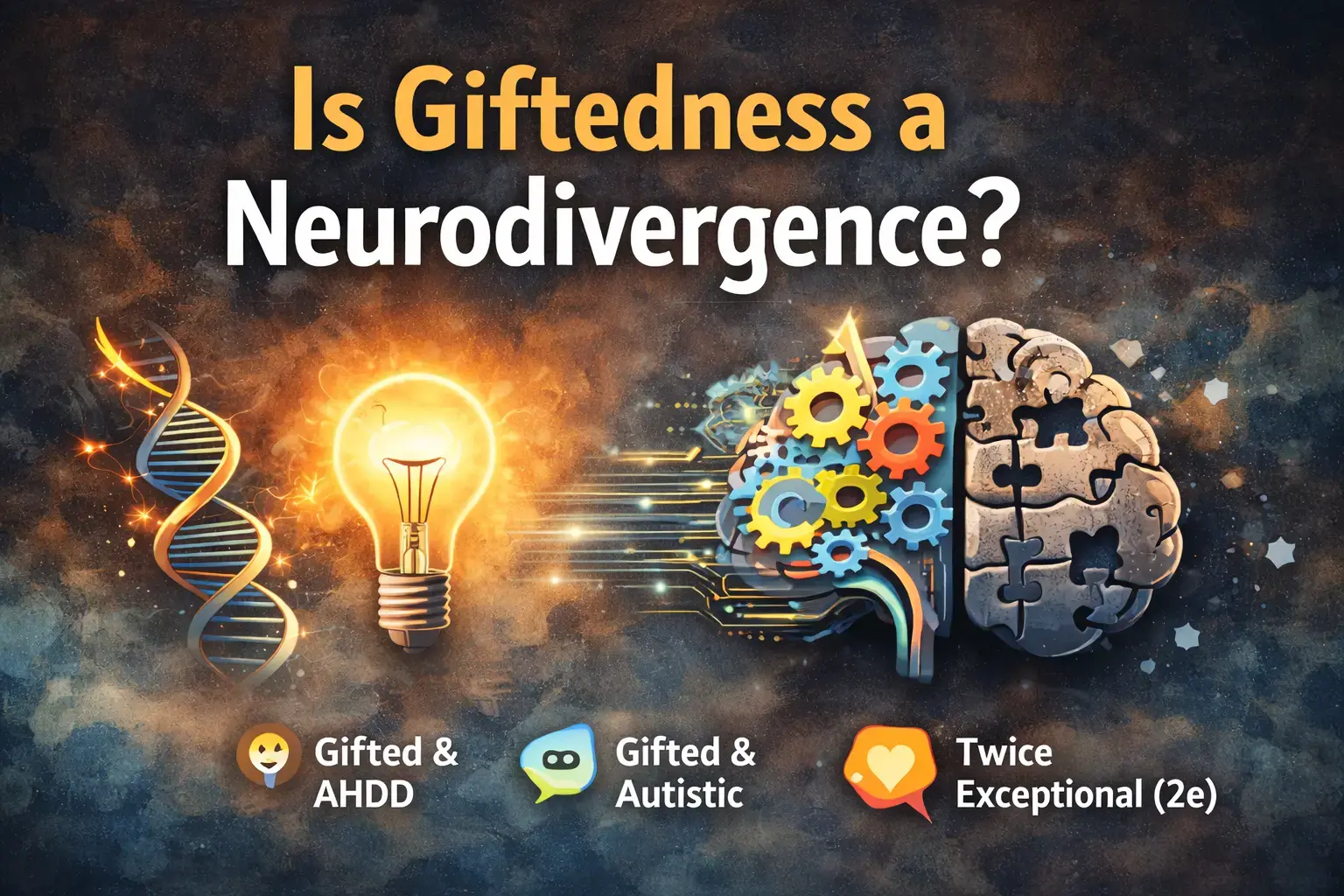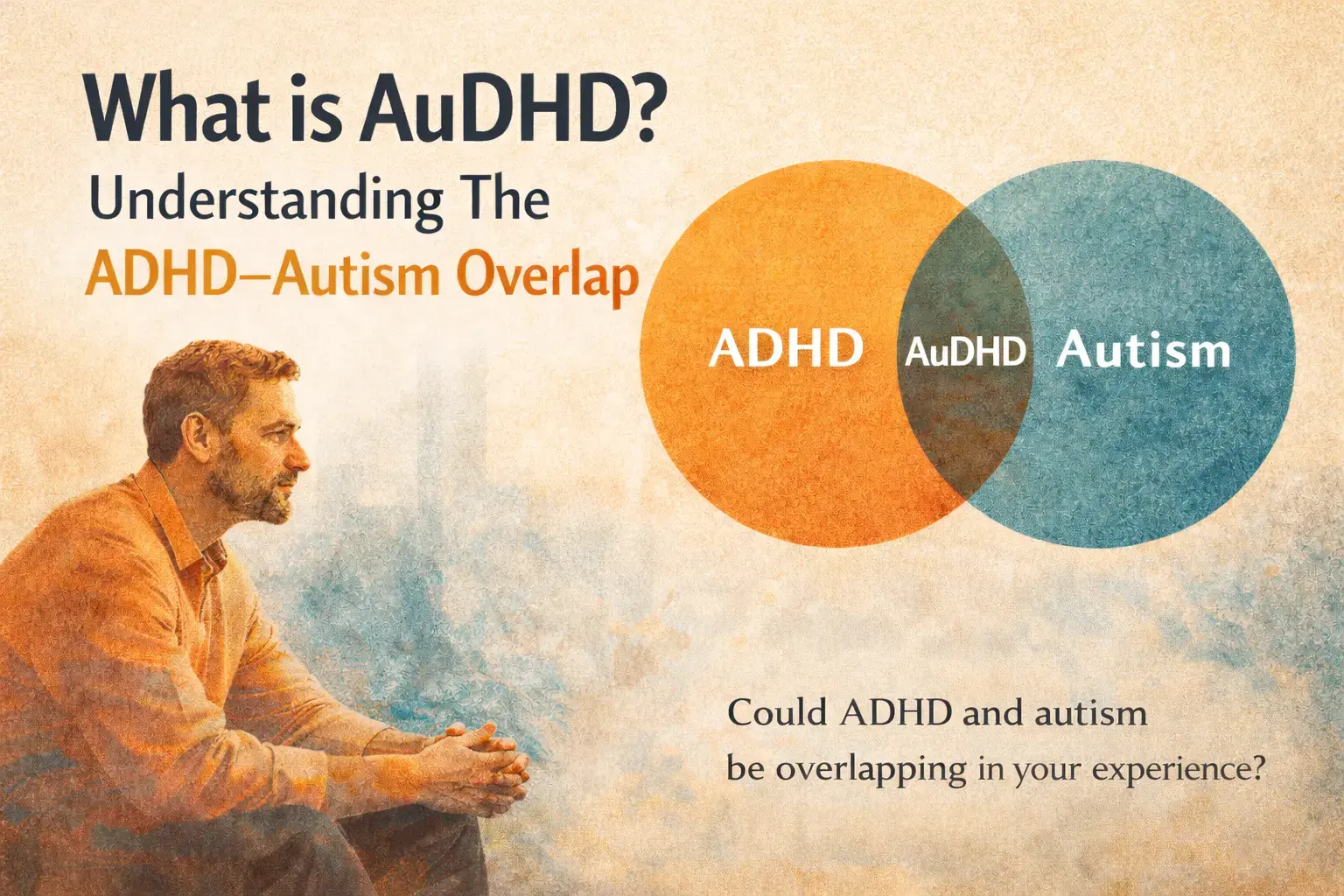Reframing Executive Function: Strengths-Based Strategies for ADHD Minds

How seeing ADHD through a lens of strengths opens new possibilities for executive function
“What looks like chaos from one angle may be creativity from another.”
When people talk about executive function, they often focus on what’s missing: organization, planning, time management, working memory, and follow-through. For many adults with ADHD, this framing feels painfully familiar. The endless to-do lists, the late-night panic when a deadline is suddenly remembered, the pile of laundry that never makes it to the closet and each moment becomes another data point in a story of being “lazy,” “careless,” or “too much.”
But here’s another truth: executive function in ADHD is not broken. It is different.
And that difference, when reframed through a strengths-based lens, reveals powerful resources — creativity, adaptability, passion, innovation, depth. These are not consolation prizes. They are real ADHD strengths that, when paired with intentional strategies, can make executive function not only manageable but meaningful.
For more tools, you may appreciate 10 ADHD coping strategies.
Why Executive Function Feels Different with ADHD
Every human wrestles with self-management. Even the most organized among us forget things, procrastinate, or feel overwhelmed by competing priorities. But for neurodivergent adults with ADHD, executive function challenges tend to be amplified.
Tasks that rely on sustained attention or delayed gratification can feel like pushing a boulder uphill. What others call “simple” — like remembering to pay a bill on time — might require extraordinary effort. And in a society that rewards punctuality, neatness, and consistency, these differences can be misinterpreted as character flaws.
Yet, neuroscience tells us a different story. ADHD brains are wired to thrive on novelty, interest, and urgency. When engaged, many people with ADHD enter states of hyperfocus where hours pass unnoticed, deep insight emerges, and creative connections flourish. This isn’t evidence of a broken system — it’s evidence of a different operating system.
The key isn’t to “fix” executive function but to recognize its patterns and build strategies around the way ADHD brains naturally thrive.
When have my ADHD traits been a strength rather than a struggle?
Strengths-Based ADHD Strategies for Executive Function
1. Reframing Through Strengths (ACT & CFT)
One of the most powerful shifts is reframing executive struggles as opportunities to use ADHD strengths.
- Acceptance and Commitment Therapy (ACT) teaches us to notice unhelpful thoughts, such as “I’ll never be good at this,” without becoming entangled with them. Instead, we can ask: What values matter most here? Maybe organization isn’t the goal itself — maybe the goal is creating space for connection, creativity, or rest.
Which values feel most alive for me, and how can I anchor my executive function in those values?
- Compassion-Focused Therapy (CFT) invites self-kindness. Instead of responding to a missed deadline with shame, we might say: This is hard, and I’m learning new strategies. My worth is not defined by this moment.
How do I speak to myself when I miss a deadline — and how could I soften that voice with compassion?
Reframing doesn’t erase difficulty. It changes the meaning we assign to it. From this place, we can begin to see ADHD traits not as flaws to overcome but as signals guiding us toward creative adaptation.
2. Practical Executive Function Tips (Strengths-Based ADHD Strategies)
While mindset matters, executive function also benefits from practical, external supports. Here are a few ADHD-friendly, strengths-based ADHD strategies:
- Harness Hyperfocus: Instead of fighting hyperfocus, schedule deep work time around it. Notice what kinds of tasks pull you in naturally and align important work with that energy.
- Externalize Memory: ADHD brains thrive when information lives outside the head. Whiteboards, sticky notes, reminders, or visual calendars become an “external brain.” This isn’t cheating — it’s a wise adaptation.
- Habit pairing (also called habit stacking) is the practice of linking a new strategy or routine to an existing habit, making it easier to remember, build consistency, and support executive functioning.
- Body Doubling: Many ADHD adults find it easier to complete tasks alongside someone else. This could be a co-working group, a friend on video call, or a professional accountability partner.
- Gamify Routines: ADHD brains love novelty and challenge. Turning chores into games — setting timers, racing the clock, or rewarding yourself for micro-steps — transforms the mundane into something engaging.
- Energy Mapping: Instead of forcing productivity at the “wrong” times, track when your energy naturally rises and falls. Align your most demanding tasks with your peak windows.
These are not band-aid solutions. They are strategies that respect how ADHD brains actually function.
Which external tools or supports feel most natural to me (whiteboards, apps, accountability partners)?
3. Nervous System & Self-Compassion Tools (Polyvagal & IFS-Informed)
Stress is the silent saboteur of executive function. When the nervous system perceives a threat, focus narrows, memory collapses, and decision-making becomes harder. For ADHD adults — often carrying years of shame around “not doing enough” — stress can make executive struggles even heavier.
- Polyvagal-Informed Practices: Gentle regulation practices like deep breathing, grounding movement, or sensory resets (like stepping outside or holding something warm) help shift the nervous system from overwhelm to calm, opening space for focus.
- Internal Family Systems (IFS) Lens: Many ADHD adults have an inner “task-avoiding part” that resists starting. Instead of seeing this as sabotage, IFS encourages curiosity: What is this part protecting me from? Overwhelm? Fear of failure? When we meet these parts with compassion, we often discover that they are trying to help in clumsy ways.
Self-regulation is not a prerequisite for executive function — it is executive function. Grounding and compassion create the inner environment where planning, follow-through, and creativity can grow.
What small nervous system practices help me return to calm before I start a task
If pacing and rest are part of your executive functioning needs, you may also connect with Why Rest Is Productive.
Rethinking Success Through an ADHD Lens
What if success isn’t about meeting someone else’s checklist but creating systems that align with your unique rhythms?
Society often equates productivity with worth. But the philosopher Rumi reminds us: “Don’t get lost in your pain. Know that one day, your pain will become your cure.”
Executive function challenges can feel painful, but they can also be the very experiences that lead to deeper creativity, empathy, and resilience. When ADHD adults design their lives around values and strengths, they often create systems that are not only functional but beautifully human.
Reframing executive function is not about denial — it’s about possibility. ADHD is not a deficit in character, but a difference in wiring. With self-compassion, supportive tools, and strengths-based ADHD strategies, executive function becomes less about chasing perfection and more about building a life that truly fits.
If you’re curious about exploring your ADHD strengths, reframing challenges, and creating sustainable systems that work with your unique brain, Becoming Yourself Counselling & Consulting offers a supportive space for that journey. Together, we can honour both the struggles and the strengths and work with you to help you find ways of living that feel authentic, compassionate, and possible.
If the reflections in this blog resonate with you, if you’d like to explore your therapy goals, you’re welcome to connect with Becoming Yourself Counselling & Consulting.
If you’d like to understand my strengths-based approach to executive functioning, you can visit my services page, where I outline how I support neurodivergent adults ‘ expectations.
If executive challenges are impacting your daily life, you’re welcome to connect through my contact page to explore sustainable support.
Or stay on the blog and learn more about ADHD, Autism, and Giftedness.
FAQ: Reframing Executive Function with ADHD Strengths
What are the main ADHD strengths that support executive function?
ADHD strengths often include creativity, hyperfocus, problem-solving, adaptability, and high energy. While executive function can feel challenging, these ADHD strengths can be used to support organization, planning, and follow-through when paired with intentional strategies.
What are the best executive function tips for adults with ADHD?
Some of the most effective executive function tips include externalizing memory (using sticky notes, apps, or planners), using body doubling for motivation, gamifying routines, and mapping tasks to your natural energy levels. These tools help ADHD adults align tasks with how their brains work best.
What are strengths-based ADHD strategies?
Strengths-based ADHD strategies focus on building systems around what you naturally do well instead of forcing yourself into rigid structures. This might mean harnessing hyperfocus for deep work, leaning on creativity to design routines, or using accountability partnerships to sustain momentum.
Why is reframing executive function important for ADHD?
Reframing executive function shifts the narrative from deficit to difference. Instead of seeing ADHD as brokenness, reframing allows adults to recognize both their challenges and their strengths. This perspective builds self-compassion and encourages more sustainable, ADHD-friendly systems.
Can therapy help with executive function challenges in ADHD?
Yes. Neurodiversity-affirming therapy can provide tailored support for executive function challenges. Approaches like Acceptance and Commitment Therapy (ACT), Compassion-Focused Therapy (CFT), and ADHD-specific coaching help individuals reframe struggles, reduce shame, and develop strengths-based strategies for daily life.
Explore ADHD Coping Strategies and Neuro-Affirming Therapy.
Blog Disclaimer
This blog includes occasional personal anecdotes used to illustrate therapeutic ideas and foster connection. All identifying details have been altered or omitted to protect confidentiality. These reflections are intended as examples only; every individual’s experience is unique, and what resonates for one person may not apply to another.
The information provided here is for educational and informational purposes and should not be considered a substitute for professional medical or mental health advice, diagnosis, or treatment. If you have concerns about your health or well-being, please consult a qualified healthcare provider or licensed mental health professional.
Psychotherapy services described on this site are available to residents of Ontario. If you are interested in support or would like to schedule a complimentary 20-minute consultation, you are welcome to contact me through my practice.
These resources are offered to support your learning and self-understanding as you move toward a more grounded, authentic, and meaningful life.

Michael Holker HBA, BSW, MSW
Michael Holker, MSW, RSW, is the compassionate heart behind Becoming Yourself Counselling. Discovering his own neurodivergence later in life shaped his existential, humanistic, and strengths-based approach to therapy. Guided by his lived experience, Michael helps neurodivergent individuals move beyond self-criticism toward self-understanding, self-compassion, and self-acceptance. His work invites clients to honour their journeys, embrace their resilience, and reconnect with their authentic selves, cultivating a life of greater alignment and meaning.


